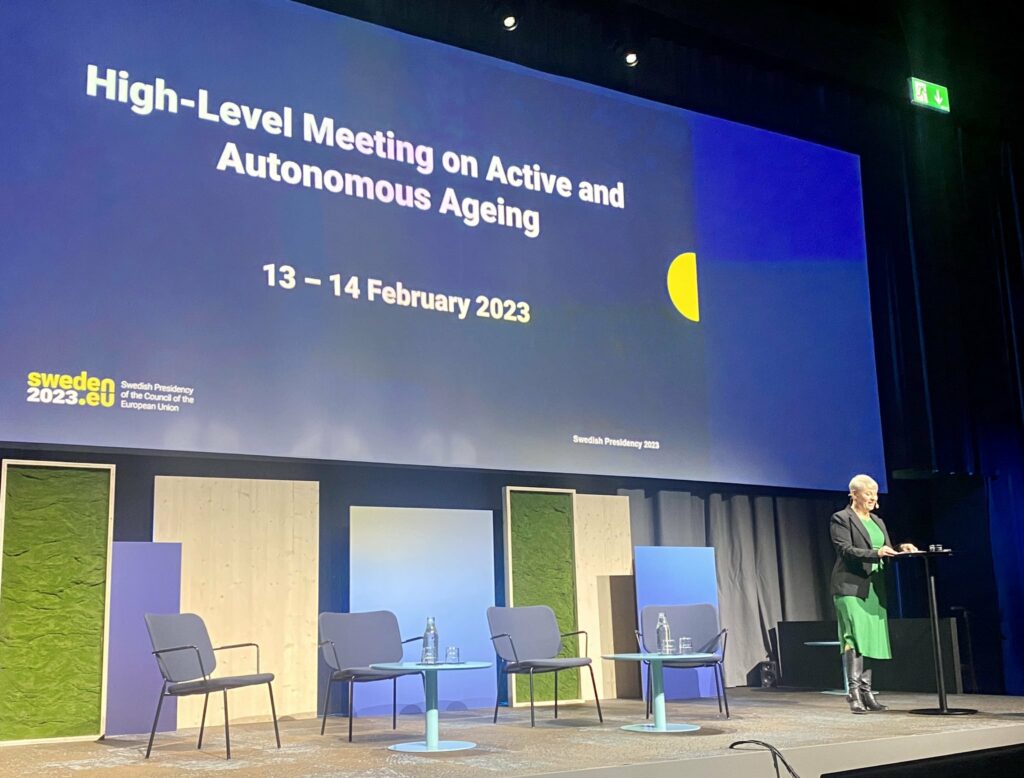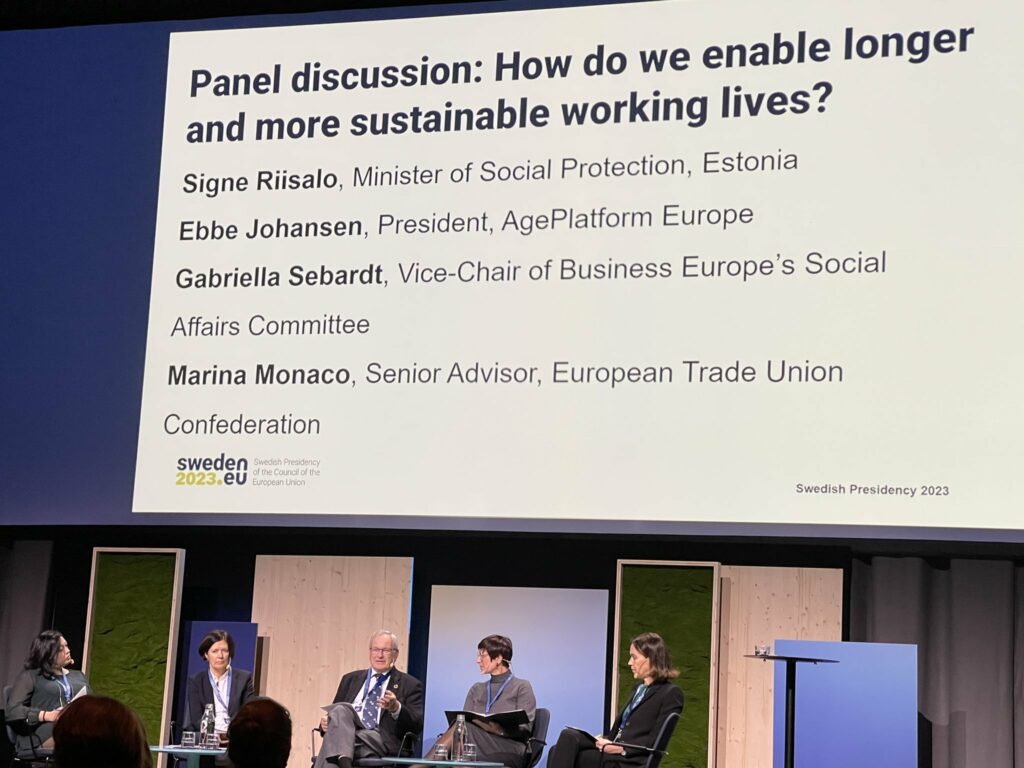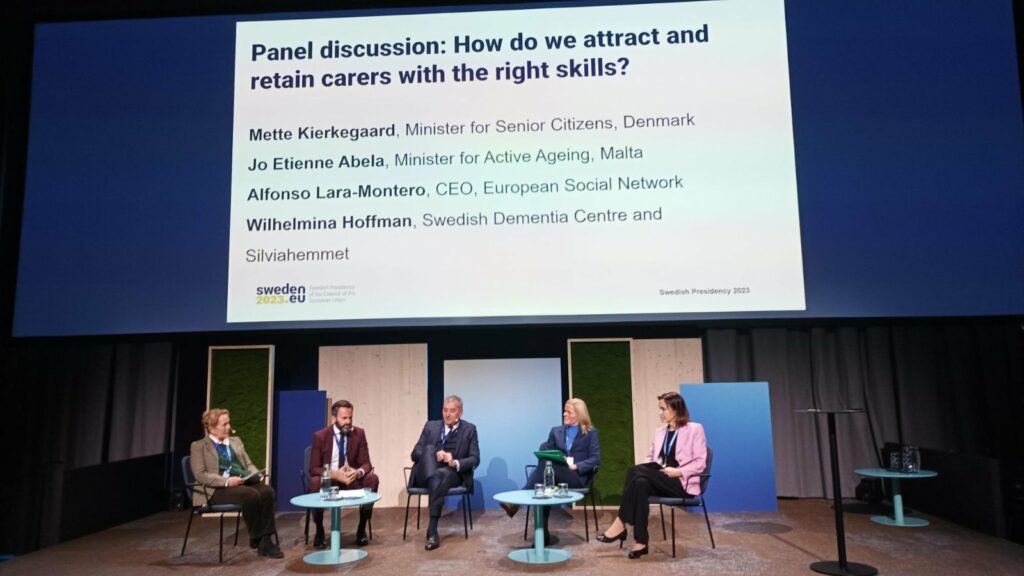On the 13th & 14th of February, EFFE was invited to participate to the high-level ministerial meeting on active and autonomous ageing organised by the Swedish Presidency of the EU council. Around 100 people were invited to participate, including political representatives and senior officials from EU Member States, representatives from the European Commission, civil society organisations, social dialogue partners and academics. The main focus of the meeting were the challenges and opportunities offered by demographic changes, including how to enable longer and more sustainable working lives and how to attract and retain carers with the right skills.

The meeting was opened by Anna Tenje, Swedish Minister for Older People and Social Security and by Dubravka Šuica, Vice-president of the European Commission and Commissioner for Democracy and Demography. According to the Minister, the main issues facing the sector are shortage occupations and the aging population, as well as the raising welfare costs, i.e. care services but also pensions. It will therefore be essential to put in place the necessary resources to ensure the resilience of the care system. For the Swedish minister, this means the ability to deploy safety nets for those who are no longer able to work and to provide accessible and high-quality long-term care. But she also encouraged those who are still able to work to pursue their careers. To do this, Mrs. Tenje recommended combating age-related discrimination and develop better recognition of skills and better possibilities for reskilling. The megatrend of aging is likely to have a considerable impact on social policies but also territorial cohesion, explained the European Commissioner. She of course came back on the initiatives set up by the Commission, mainly the Care strategy in order to improve the situation of carers, whether formal or informal, and respond to the gender employment gap. She insisted on the need for investments in long-term care and welfare systems and to develop partnerships for friendly aging environments.
For the first Panel “Enabling longer and more sustainable working lives”, Signe Riisalo, Minister of Social Protection from Estonia was invited along with some social partners (Age Europe, Business Europe & ETUC) to reflect on policy measures to strengthen opportunities, increase incentives and reduce obstacles for people to further extend their working lives. The objective of the Swedish presidency was to underline that efforts from several different stakeholders are required to enable longer, and more sustainable working lives across the EU. The importance of lifelong learning was risen which brings the questions of upskilling and improving working environment. The stakeholders have insisted that this is far from being a reality for the moment. Age continues to be a factor of discrimination and working conditions remain difficult. To ensure healthy working lives, it would be necessary to ensure that the welfare system is sustainable because for the moment this is essentially based on the care sector.

Although member states have come to recognize the need to improve working conditions, Sándor Czomba, Deputy State Secretary, Ministry for Economic development of Hungary, Martina Štěpánková Deputy Minister of Labor and Social Affairs in charge of European Funds and International Cooperation of Czech Republic and Raf Boey, Adviser of the Department of Labor and Social Economy of the Flemish Government in Belgium, further insisted on the need to invest in skills. This is part of their voluntary approach: providing upskilling or reskilling opportunities allows better working conditions especially for those who are not able to continue their career but still wish to work.
The second day, the event, focused on good practices and innovative ideas concerning how to attract workers with the right skills to the long-term care sector. Anna Tenje underlined that accessible and affordable care services are essential for an equal society, to autonomy and solidarity between generations. Even if she called to mitigate the need of care due to longer and healthier lives, she pointed that many member states rely on informal care. She presented that the challenge of the shortages of workers essential for the functioning of our care sectors as an opportunity with a potential of almost 8 million jobs at EU level. Minister Tenje declared that if we succeed in adjusting our societies so that we have longer but also more sustainable working lives, she believes it will strengthen our competitiveness and bring growth and economic prosperity to the European Union.
Maria Jepsen, Vice president of Eurofund introduced the topic by explaining the challenges that the care sector is facing and compared the experiences of different EU Member States. She discussed the notion of right skills, explained why EU Member States struggle to attract and retain workers with the right skills, elaborated on how this issue could be dealt with, and contemplated on what role technology can play moving forward. She highlighted that there are 44 million frequent informal carers to older and disabled relatives/friends with high resilience on women and foreign workers. To attract and retain carers with the right skills she insisted on the necessity to improve working conditions, develop policies to improve education and training, implement initiatives to reduce barriers for employment and launch information campaign in order to make the care sector more attractive. Most important, she demonstrated that collective agreements have a considerable impact on working conditions, skills and pay and that workers are often excluded from these agreements and not included in statistical data. She raised the importance to move from a residential system to a home care-based system in order to match with the wish of care receivers, enabling them to remain in their home and to develop better solutions for public finances.
The second panel aimed at illustrating that Member states share challenges when it comes to recruiting and retaining staff with the right skills in the care sector. Working conditions, continuous upskilling and skills validation as well as the potential role of technology and digital innovation were highlighted during this session.

EU Member State representatives from trio presidencies, France, Czechia, Spain, Belgium and Hungary concluded the first and second day by reflecting on both days discussions and sharing experiences on Europe’s ageing societies and how to enable longer and more sustainable working lives. Demographic ageing seems to be one of the priorities of the coming triumvirate.
In conclusion, the high-level meeting raised a political debate and highlight the latest evidence on the effects of different measures and policies in promoting a longer working life, recognising that no measure alone is sufficient and that change needs to be driven simultaneously by various actors at different levels of society. There was a consensus among policy makers, social partners, employers, and civil society who participated about the need to attract workers with the right skills to the long-term care sector, as well as the importance to address the issue of the digital transition and the role it has to play. Indeed, even if it is important to encourage longer working lives and fighting age discrimination it is even more important to ensure it is possible. To reach this objective, speakers agreed on the need to reduce the burden of care workers as per as their working conditions but also by investing in education and skills. The necessity to develop a strong social dialogue and collective agreements arrived rather late in the debate, but throughout the discussions it appeared essential in the improvement of working conditions. To attract and retain care workers, they must be involved in the exchanges. Unfortunately, this observation did not come soon enough to invite representatives of the sector to intervene, despite the fact that several stakeholders stressed the need to move from a residential system to home care-based system, what the French representative, Mr. Jean-Benoît Dujol called “virage domiciliaire”.
With the high-level meeting, the Swedish Presidency wished to highlight the importance of sharing good practices and innovative ideas on these matters and has therefore invited EU Member States and other participants to a joint reflection on ways forward in relation to Europe’s ageing societies.
EFFE joined the participants to explain that Personal and Household Services, and especially home care workers directly employed by households are part of the solutions to overcome the challenges related to population ageing.
EFFE joins speakers by underlining that the terms of the debate are clear: demand for care services will only increase as the EU population grows older in the coming decades. Accordingly, policymakers will need to take a careful, considered approach to care policy – one based on respect for people and their decisions, which puts accessibility, affordability, and quality at its heart, and works for the different care models of the 27 Member States.
Such a policy is vital to ensure that EU citizens have a genuine choice between residential and home care.
Therefore EFFE calls on the European Commission, Council of the EU and European Parliament to:
– Recognise the ability of individuals in need of care and their families to choose the care path that is best for them – residential or home care, direct employment or through service providers – and empower them to make that decision;
– Adopt a rights-based approach to guide policy thinking on care and place autonomy at the centre of policymaking in care
– Commit to officially recognising and supporting the PHS sector to ensure everyone has the right to affordable and accessible long-term care services of good quality – in particular homecare and community-based services.
– Recognise the diversity of care models in the EU and the added value of a model where households care directly hired domestic & homecare workers.